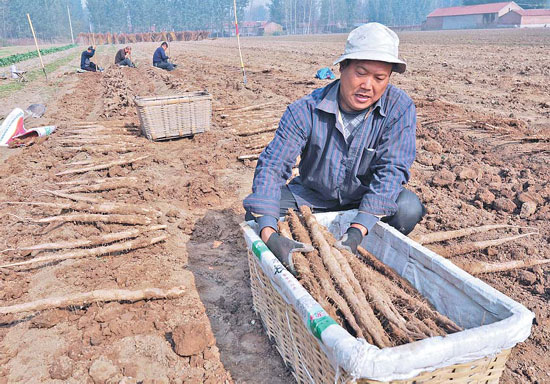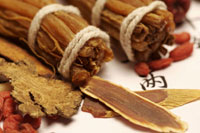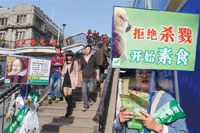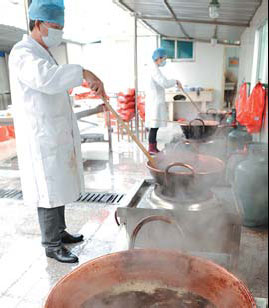Happy, healthy and herbal
Updated: 2013-01-04 10:58
By Lin Jing (China Daily)
|
||||||||
 |
|
Farmers reap yam at Zouping county, Shandong province, on Oct 26. Yam is a major ingredients used in Chinese herbal cuisine. Dong Naidei / For China Daily |
The Chinese have been using herbs in cuisine for as long as they can remember. Food as medicine or medicine in food is nothing new to a civilization that started cooking more than 5,000 years ago. Lin Jing looks at how the tradition is kept alive to this day.
Freezing weather blows in together with the New Year, and it is at this time that Huang Mingjin is busiest in the kitchen preparing Chinese herbal cuisine for her family.
"Chinese herbal cuisine is good for
|
 |
Chinese herbal cuisine has been a tradition in her family for more than 20 years. At first, she had learned the recipe from local doctors. Later, she consulted other professionals about the effects of some of the herbs.
During the season, Huang will spend hours every fortnight stewing mutton and carrot soup, into which she adds wolfberry and Chinese angelica root or danggui (radix angelica sinensis). She says these traditional herbs will warm up the body and help give energy to resist the cold in winter.
Huang is typical of the average Chinese who believes herbal cuisine can build up strength and ward off diseases. She comes from a very long line of believers.
The word yaoshan (herbal cuisine) first appeared in ancient books in the Han Dynasty (206 BC-AD 220), but the actual use of herbs in cookery can be traced back to the Xia Dynasty (21st-16th century BC), when people first discovered that certain wild plants could be used as medicine or as food, or both.
As the Chinese enjoy better standards of life, they are paying closer attention to healthcare and herbal cuisine is enjoying resurgence for both its efficiency as medicine and its palate-pleasing properties.
Compared to conventional medical treatment, herbal cuisine is certainly milder and easier to stomach.
Long Yongquan, the executive Chinese chef with Traders Hotel in Beijing, says herbs used in soup are different from herbs used for medicinal brews.
"Medicines given by doctor are for curing diseases, while herbs we put in the soup are supplements," says Long.
"Strictly speaking, we choose herbs that can be used both as Chinese traditional medicine and food for herbal cuisine, such as Chinese yam and longan," he says.
|
|
|
Staff cook Chinese herbal cuisine at a maternal and child health center at Dongyang, Zhejiang province, on Nov 5. Bao Kangxuan / For China Daily |
Long has been a Chinese chef for more than 20 years and he specializes in Chinese herbal cuisine. He says that for the weak and old, food therapy provides a good choice to speed up recovery or recuperation.
The types of herbal cuisines vary in different seasons as well. In the cooler seasons of autumn and winter, people may need warmth inside to help resist the cold. But in summer, people like to drink herbal tea made of chrysanthemum and licorice to eliminate the heat inside, or treat sore throats.
Some more frequently used herbs include ginseng, Chinese angelica, and Chinese yam, all of which have mild medicinal effects.
These herbs would be cooked with other ingredients such as vegetables or chicken, simmered for at least five hours to better help the nutritious elements fuse into the soup.
Long says chefs have to consult medical professionals about the right nutrition and functions before cooking herbal cuisines.
"We have to be careful," he says. "Some herbs and food are not supposed to be together, otherwise it may induce discomfort."
For example, he says, if sweet potatoes and persimmons are cooked or eaten together, it may induce gastrolithiasis, the presence of calcified stones in the stomach.
At Traders Hotel, which has been serving Chinese herbal cuisine since 2009, the chef says the most popular dish is "double boiled abalone with Chinese yam".
"Chinese yam is a typical herbal ingredient. It is good for the kidney and helps to warm you up in the winter. It can also aid digestion, and lower blood sugar."
He also recommends this soup to Westerners, who are used to taking cold sandwiches and chilled drinks during winter.
Not only the elderly, but young people these days are showing an increased interest in herbal cuisine.
 |
Zhang Yuan, 26, an engineer in Beijing, likes to cook chicken soup every week. She uses typical herbs such as ginseng, wolfberry and sweet milk vetch (huangqi or astragalus) in the soup. She learnt how to cook it from her parents.
"I used to be quite skinny a few years ago, but I am fit now, thanks to the chicken soup," says Zhang. "Besides, I also enjoy the cooking."
For novices, it is still better to consult a doctor before cooking herbs at home.
Li Zhong, a TCM doctor with Beijing Dongzhimen Hospital, says: "When cooking at home, the amount of herbs used every time should be less than 15 grams and ingredients should also vary according to who you are cooking for."
For some, like teenagers, even ginseng may be too strong. "They should understand their own physical conditions and the effects of each herb first. When cooking, they can start by putting in small amounts of the herbs, in case there are any side effects."
Li emphasizes that herbs in cooking can never replace medical treatment or necessary exercise, and people should choose herbs that are best for them, not just expensive ones such as the extravagantly expensive Chinese cordyceps.
Contact the writer at linjingcd@chinadaily.com.cn

 'Taken 2' grabs movie box office crown
'Taken 2' grabs movie box office crown
 Rihanna's 'Diamonds' tops UK pop chart
Rihanna's 'Diamonds' tops UK pop chart
 Fans get look at vintage Rolling Stones
Fans get look at vintage Rolling Stones
 Celebrities attend Power of Women event
Celebrities attend Power of Women event
 Ang Lee breaks 'every rule' to make unlikely new Life of Pi film
Ang Lee breaks 'every rule' to make unlikely new Life of Pi film
 Rihanna almost thrown out of nightclub
Rihanna almost thrown out of nightclub
 'Dark Knight' wins weekend box office
'Dark Knight' wins weekend box office
 'Total Recall' stars gather in Beverly Hills
'Total Recall' stars gather in Beverly Hills
Most Viewed
Editor's Picks

|

|

|

|

|

|
Today's Top News
Boston bombing suspect reported cornered on boat
7.0-magnitude quake hits Sichuan
Cross-talk artist helps to spread the word
'Green' awareness levels drop in Beijing
Palace Museum spruces up
First couple on Time's list of most influential
H7N9 flu transmission studied
Trading channels 'need to broaden'
US Weekly

|

|








